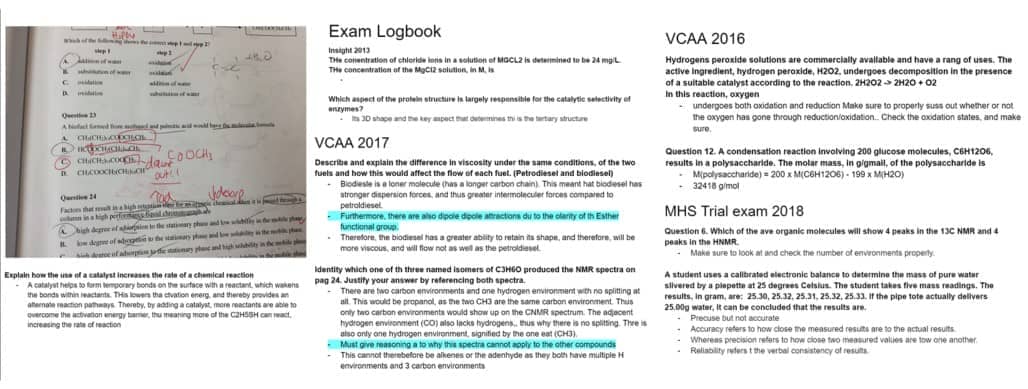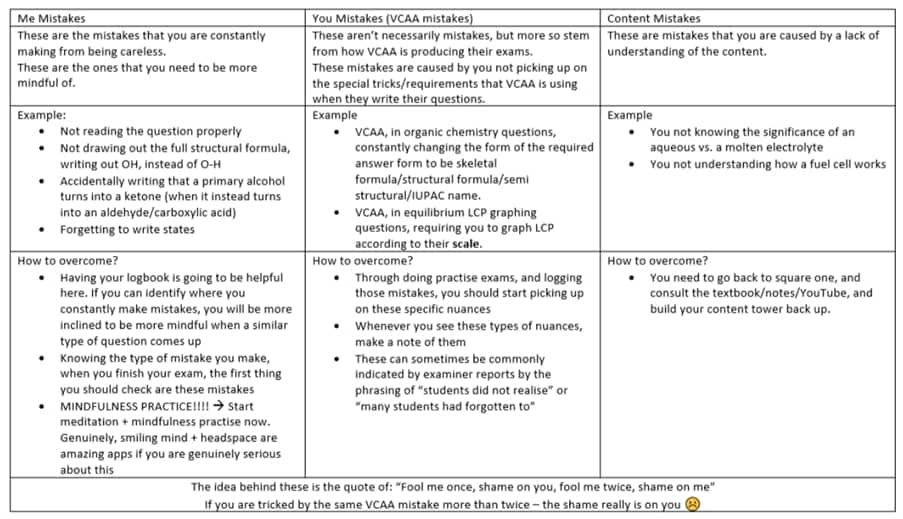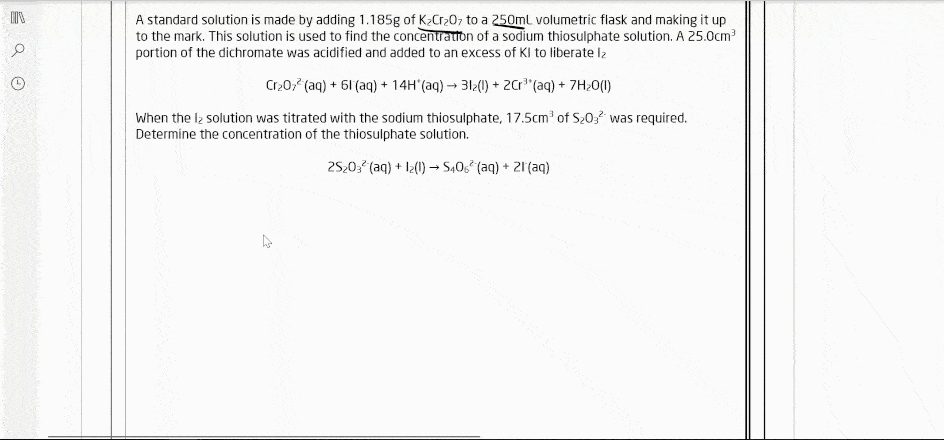9 Chemistry Exam Tips from a 50 Raw Student
Hey! I’m Eric, and I graduated from Melbourne High School last year with a 50 raw in VCE Chemistry 3/4. In this post I’ve compiled some advice for the VCE Chemistry 3/4 Exam. This is by no way a definitive list, and overall, take everything with a grain of salt. What worked for me may not necessarily work for you!
ExamPreparation Tips
TIP #1: Overall Approach to VCE Chemistry Exam Revision
Take your VCE Chemistry exam revision slow and steady. It’s a marathon – not a sprint. I personally stressed myself out way too much thinking that I needed to do X number of exams and get Y amount of marks. It was only when I started to take a step back, and properly learnt the content – the content that the exam was trying to test – that I found myself actually improving in Chemistry.
TIP #2: Logbooks and Reviewing Mistakes
Make a summary or error logbook of each VCE Chemistry exam that you do right after you’ve finished the exam. You should find yourself spending equally as much – if not more – time correcting and learning from an exam, as it takes to actually do it!
Especially when you start out – you’ll be following a bit of an 80/20 rule. 20% of the time actually spent doing the exam; 80% learning from it. You will find that the first time you do an exam, it might take you over 3 days, just because of (1) how long it is, and (2) how much content you can learn from a single exam. The best method I found to do this was, when starting out, to consult the textbook to learn/confirm your knowledge every time you did a question.
Therefore, what I apply even in my own exam preparation nowadays is to: read the question → answer the question → consult my textbook → answer the question again → consult the examiner’s report/answer guide → make notes on anything to improve.
Another major thing is also to make sure that when reviewing mistakes, you are reviewing the entire topic rather than just solely what the question is asking. For example, if the question is about methanol fuel cells, and you’ve gotten it wrong, when you review the topic, you don’t just review methanol fuel cells, you review fuel cells in general, and if need be, even the whole area of redox and cells. Whilst reviewing specifics is great, reviewing the full topic helps to identify foundational cracks in your knowledge.

Excerpt’s from Eric’s 130-page error logbook in preparation for the VCE Chemistry exam.
TIP #3: Identify the Type of Mistakes You’re Making!
Very, very broadly… and only VERY BROADLY – a lot of your mistakes can be classified into 3 different categories.
I’ve highlighted an excerpt from our “Exam Revision Guideline” document, but the main idea here is that if you are able to identify the type of mistake you are making, it makes it a lot more easier to target techniques to rectifying them.

Excerpt from Eric’s ‘Exam Revision Guideline’ document for his VCE Chemistry 3/4 Tutoring.
Heart to Heart – Personal Advice 😊
TIP #4: This is Your Own Journey
Please, please, please don’t compare yourself to others. I found myself constantly being aware that I got X mark, but my friends were getting Y mark, and this always stressed me out.
Try to take a step back, and realise that you are on your own journey in VCE Chemistry, and that it’s your own character development that truly matters here.
TIP #5: Chemistry is Supposed to Be Fun!
VCE Chemistry is an actually interesting subject. I found the constant asking of the question “why” super helpful. For example, “Why does X occur? Why does Y occur, and why is X related to Y? Why is VCAA asking me this question?” etc.
My favourite example of this are the many case studies VCAA includes. For example, the classic carboxy-haemoglobin equilibrium case study in AOS 3: Rates and Equilibrium is a super interesting example of why Kc values are so important in a real-life (and even medical) context. Not only that, but it also enables VCAA to directly force you to apply your knowledge of equilibrium to practical problems compared to textbook style questions.
Being able to critique and apply the content deeply helps to develop a stronger understanding of what the content is about, what is relevant, and why it is relevant.
Question Specific Advice
TIP #6: A Technique for Chemistry Exam Questions
In VCE Chemistry, for those pesky 5-7 marker extended response essay questions, please remember – diagrams, diagrams, diagrams, keywords keywords keywords, sub-headings, sub-headings, sub-headings.
In general, for all of these questions, try and divvy up your response into a few key ideas. Treat these as almost English essays if you want. Furthermore, try to incorporate keywords wherever you can. But don’t just vomit them out onto the page (you can if the situation gets desperate). Instead, these keywords can serve as a very helpful road map for what you want to write about, as well as ensuring you hit all the points VCAA wants out of a full mark response.
TIP #7: Link Chemistry Concepts Together Intuitively
When answering a VCE Chemistry question, try and link concepts together as well as you can, to indicate progression in your answer. This is especially relevant for equilibrium, rates of reaction, and food chemistry.
For example, “Increasing the temperature will increase the kinetic energy of the molecules. This will cause an increase in frequency of collisions as well as an increase in the proportion of molecules with greater energy than the activation energy barrier. Overall, this will lead to more successful collisions with the correct orientation that overcome the activation energy barrier, hence increasing the rate of reaction.”
Note the A → B → C and D → E → F format of structuring the answer, as well as the unnecessarily superfluous use of keywords (hah-get it?).
TIP #8: Draw Diagrams And Another VCE Chemistry Technique
In VCE Chemistry, always try and set out working out in your response, and draw diagrams – especially for volumetric analysis questions. For example, drawing out the volumetric flasks, pipettes, conical flasks, burette, and annotating as you go, so that you can not only focus on details, but also have an idea of the bigger picture.
Here’s an example – it’s very messy, but hopefully you get the point. Draw out your diagram, and logically make your way through it. A very big problem sometimes in these types of questions is being able to distil down all the information VCAA is giving to you. Therefore, diagrams will really help to break all this information down, as well as giving you a roadmap to work your way through the question.

Video of Eric drawing a titration diagram during his VCE Chemistry 3/4 Tutoring.
TIP #9: Miscellaneous Tips
- When writing chemical reactions, don’t forget states. Remember that if something is in a solution, it is (aq), but if it is molten, the state is (l).
- Check for correct units (g/kg, J/kJ/mJ). Don’t forget units when writing your Kc value.
- Check for significant figures.
- Check that your organic compounds correctly have 4 bonds.
- Check the naming of your organic compounds (everyone always counts the wrong number of carbons!).
- When you’ve finished answering, go back and re-read the question to see if you’ve missed anything. Also helps to make sure you’ve actually answered the question.
- Use a highlighter 😊
All in all, just try your best! Give yourself breaks, and at the end of the day, be proud of what you have done. You guys have gone through an absolutely unprecedented year, so don’t put too much pressure on yourself. Put in as much effort as you can, believe in yourself, and from me to you, I am sure you are going to smash this VCE Chemistry exam! 😊 ~ Eric
If you want to join Eric’s VCE Chemistry 3/4 Tutoring then click here to register for a trial lesson for FREE!

